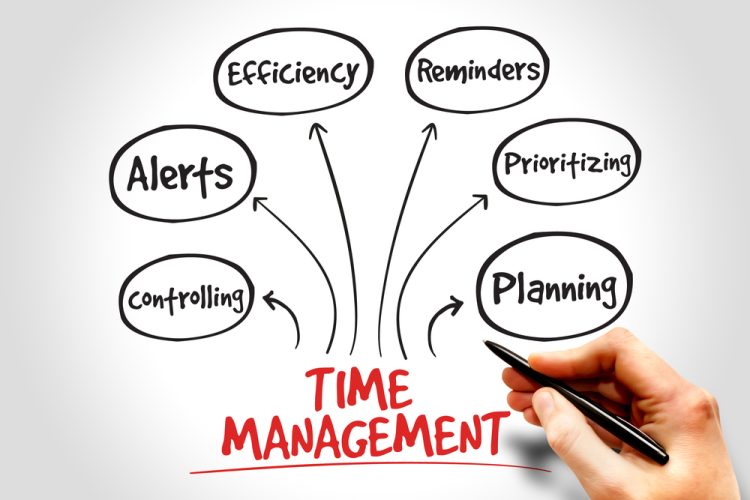Time management is an essential skill that can transform your productivity, reduce stress, and help you achieve your goals efficiently. In today’s fast-paced world, with numerous distractions and tasks demanding your attention, organizing your day can often feel overwhelming. However, with the right strategies, anyone can manage their time more effectively and make the most out of each day.
This article will delve into simple yet highly effective time management techniques that can help you organize your day, increase productivity, and strike a balance between work and personal life.
The Importance of Time Management

Before diving into the strategies, it’s essential to understand why time management matters. Poor time management can lead to missed deadlines, increased stress, and lower productivity. It can also harm your relationships and overall well-being by making it difficult to prioritize personal time.
Effective time management, on the other hand, helps you:
- Achieve more in less time.
- Improve your decision-making abilities.
- Lower stress levels.
- Enhance your work-life balance.
- Increase focus and productivity.
Now, let’s explore the time management techniques that can help you organize your day effectively.
1. Prioritize Your Tasks
The first step to organizing your day is to prioritize your tasks. Not all tasks are of equal importance, and understanding what needs to be done first is critical. Use methods like the Eisenhower Matrix, a prioritization tool that divides tasks into four categories:
- Urgent and important: Tasks that need to be done immediately (e.g., deadlines, crises).
- Important but not urgent: Tasks that contribute to long-term success but don’t require immediate action (e.g., strategic planning).
- Urgent but not important: Tasks that require attention but may not contribute significantly to your goals (e.g., interruptions, minor requests).
- Not urgent and not important: Tasks that can be eliminated or postponed (e.g., time-wasting activities).
By focusing on the first two categories, you’ll ensure that your day is filled with meaningful, high-priority tasks that help you achieve your long-term goals.
Healthy Eating on a Budget: Tips and Tricks for Affordable Meal Planning
2. Use Time Blocking
Time blocking is a time management technique where you schedule blocks of time for specific tasks or activities throughout your day. By allocating set periods for each task, you prevent distractions and stay focused on the task at hand.
To get started with time blocking:
- Identify key tasks and allocate specific times for them on your calendar.
- Include breaks in your schedule to recharge.
- Be realistic about how much time each task will take, and don’t overload your schedule.
For example, you might block 9:00 AM to 11:00 AM for work-related tasks, 11:00 AM to 12:00 PM for emails, and 1:00 PM to 3:00 PM for project meetings. Time blocking ensures that every hour of your day is accounted for, making it easier to manage your workload.
3. Set SMART Goals
Goal-setting is essential for staying focused and organized. Using the SMART criteria helps you set clear, actionable goals:
- Specific: Clearly define what you want to accomplish.
- Measurable: Determine how you’ll measure your progress.
- Achievable: Ensure your goal is realistic and attainable.
- Relevant: Align your goal with your larger objectives.
- Time-bound: Set a deadline for completion.
For instance, instead of saying, “I want to improve my writing,” a SMART goal would be: “I will write 1,000 words every day for the next two weeks to complete my article by the deadline.”
Setting SMART goals helps you break down your tasks into manageable chunks and gives you a clear target to work toward each day.
4. The Pomodoro Technique
The Pomodoro Technique is a time management method that breaks your work into intervals, typically 25 minutes long, followed by a 5-minute break. After completing four Pomodoros (25-minute work sessions), you take a longer break, around 15-30 minutes.
This method helps in several ways:
- Improves focus by working in short, timed bursts.
- Encourages regular breaks, reducing burnout.
- Helps manage distractions by committing to just 25 minutes of focused work.
You can use tools like timers or Pomodoro apps to implement this method. It’s especially effective for those who struggle with procrastination or distractions.
5. Limit Multitasking
Contrary to popular belief, multitasking is not an efficient way to get more done. When you switch between tasks, your brain has to refocus each time, leading to more errors and a longer completion time.
To manage your day effectively, focus on one task at a time. Single-tasking allows you to give your full attention to each task, resulting in better quality work and faster completion. Set aside dedicated time for each task, and resist the urge to check emails or social media in between.
6. Delegate When Possible
If you’re trying to do everything yourself, you’ll quickly become overwhelmed. Delegation is a critical aspect of time management, especially for tasks that others can do just as well (or better) than you.
To delegate effectively:
- Identify tasks that can be assigned to others.
- Choose the right person for the job.
- Provide clear instructions and set expectations.
- Trust the person you delegate to, and avoid micromanaging.
Productivity Hacks for Busy People: How to Get More Done in Less Time
Delegating allows you to focus on high-priority tasks that require your expertise while ensuring that other tasks are still being completed.
7. Create a Daily To-Do List
A simple but highly effective way to organize your day is by creating a to-do list. This list should include all the tasks you need to complete by the end of the day. However, avoid overwhelming yourself with too many tasks—limit the list to the most important ones.
To make your to-do list more manageable:
- Break larger tasks into smaller, actionable steps.
- Use a prioritization system (such as numbering or colour-coding) to identify urgent tasks.
- Review your list at the end of each day to track your progress.
Whether you prefer digital to-do lists or traditional pen and paper, having a clear list of tasks helps you stay focused and ensures that nothing slips through the cracks.
8. Avoid Procrastination
Procrastination is one of the biggest barriers to effective time management. It often stems from feeling overwhelmed or unsure about how to start a task. To combat procrastination:
- Break the task into smaller, less intimidating steps.
- Start with the easiest or most enjoyable part of the task.
- Use time management techniques like time blocking or the Pomodoro Technique to create a sense of urgency.
It’s also essential to identify your triggers for procrastination. Do you procrastinate because you’re tired, bored, or distracted? Once you understand why you’re putting things off, you can address the root cause and take proactive steps to stay on track.
9. Minimize Distractions
In today’s world of constant notifications and digital distractions, staying focused on your tasks can be challenging. However, minimizing distractions is essential for effective time management.
Some tips for minimizing distractions include:
- Turn off notifications: Silence your phone and turn off notifications for social media, emails, and messaging apps while you’re working.
- Set boundaries: Let coworkers or family members know when you need focused work time.
- Create a dedicated workspace: Whether you’re at the office or working from home, designate a space specifically for work to help you stay focused.
- Use focus tools: Apps like Freedom, Cold Turkey, or Focus@Will can block distracting websites or create a productive work environment with background music.
By reducing distractions, you’ll be able to work more efficiently and complete tasks faster.
10. Learn to Say No
One of the most challenging aspects of time management is learning to say no to tasks or commitments that don’t align with your priorities. Saying yes to every request can lead to overcommitment and burnout.
When deciding whether to take on new tasks or projects, ask yourself:
- Does this align with my current goals and priorities?
- Do I have enough time to commit to this without compromising other important tasks?
- Will this bring value to my personal or professional life?
If the answer is no, it’s okay to decline the request. Politely but firmly say no, and explain your reasons if necessary.
11. Plan Your Day the Night Before
One of the best ways to start your day productively is to plan it the night before. This allows you to hit the ground running and eliminates the time you would spend in the morning figuring out what to do.
To plan your day:
- Review your to-do list and prioritize tasks.
- Estimate how much time each task will take.
- Schedule your tasks using time blocking or another method.
- Set out any materials you’ll need for the next day, such as documents, tools, or equipment.
By having a clear plan in place, you can start your day with focus and direction, increasing your chances of success.
12. Reflect and Adjust
Effective time management is an ongoing process that requires regular reflection and adjustment. At the end of each day, take a few minutes to reflect on your progress:
- Did you complete all of your high-priority tasks?
- Were there any distractions or obstacles that slowed you down?
- What can you improve for tomorrow?
Use this reflection time to adjust your time management strategies. For example, if you found that you were frequently interrupted during the day, you might need to set clearer boundaries or adjust your time-blocking schedule.
13. Take Care of Yourself
Finally, effective time management is not just about work—it’s also about taking care of yourself. Make sure to schedule time for:
- Breaks: Regular breaks throughout the day help you stay energized and focused.
- Sleep: Aim for 7-9 hours of sleep per night to maintain peak performance.
- Exercise: Physical activity boosts energy, reduces stress, and improves focus.
- Relaxation: Set aside time for hobbies, family, and relaxation to maintain a healthy work-life balance.
When you prioritize self-care, you’ll have more energy and focus to manage your time effectively.

Mastering time management is key to a productive and balanced life. By prioritizing tasks, setting SMART goals, and minimizing distractions, you can organize your day more efficiently. Techniques like time blocking, the Pomodoro Technique, and creating daily to-do lists help you stay focused and on track.
Remember that time management is a skill that requires practice. Start by implementing a few of the strategies mentioned above, and gradually adjust them to fit your personal needs. With consistent effort, you’ll find yourself achieving more in less time while maintaining a healthier work-life balance.
Building Resilience: Strategies for Mental and Emotional Well-Being





